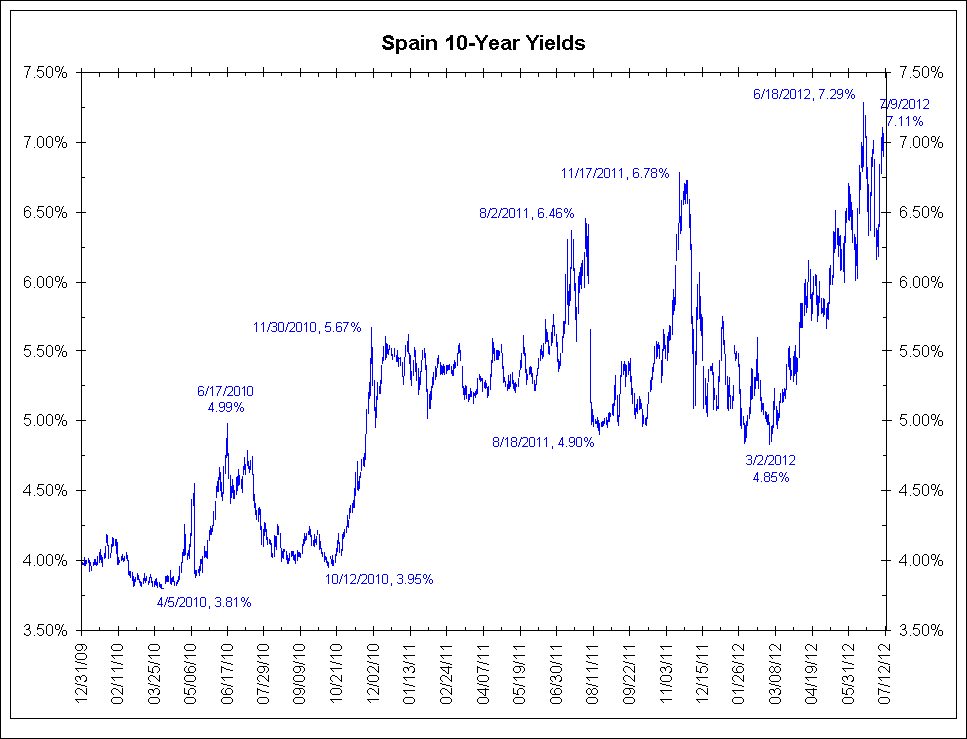Click to enlarge:
The Financial Times – Spanish bailout talk returns as bond yields leap
Just when Madrid thought it could breathe again, the markets have turned. Spain’s borrowing costs have rebounded sharply, returning to near euro-era highs, and investors are speculating it may need to seek a full sovereign rescue. A European Union summit last month that, in theory at least, resulted in a near-perfect outcome for Spain – proposals for direct bank recapitalisations and potential intervention in the sovereign bond market – provided only a fleeting reprieve. The initial optimism was doused by comments from Dutch and Finnish officials that Madrid would still in some form be liable for the €100bn of loans on offer for Spain’s banks. Moreover, direct bank recapitalisations by the €500bn European Stability Mechanism. the new eurozone bailout find, will only be allowed once the European Central Bank assumes a pan-European banking supervisory role. “In theory this will happen by the end of the year, but in reality it will take much longer,” says Nick Gartside, chief investment officer for international fixed income at JPMorgan Asset Management. “If Spain is forced to guarantee loans then the summit has produced little: it won’t have broken the links between governments and banks.”More broadly, public differences over the details of the summit deal has left investors unimpressed. “There seems to be disagreement on the agreement,” says Phillip Apel, head of interest rate strategy at Henderson Global Investors.The result has been to push Spanish 10-year composite bond yields back up to more than 7 per cent and two-year yields to above 5 per cent. Those gains have fuelled concerns that Spain could be forced to turn to the ESM for help.
The Financial Times – Eurozone draws up Spanish aid blueprint
Eurozone finance ministers reached agreement early Tuesday on the blueprint for Spain’s €100bn bank bailout plan, a deal expected to see the first €30bn in aid from the eurozone’s €440bn rescue fund sent to Madrid by the end of the month. Although the final memorandum sealing the deal will not be officially agreed until July 20, senior eurozone officials said it will include further in-depth stress tests for 14 of Spain’s largest financial institutions followed by a requirement that Madrid segregate the banks’ distressed assets into a “bad bank”. “The key component of the programme is an overhaul of the weak segments of the Spanish financial sector,” said Jean-Claude Juncker, the Luxembourg prime minister who heads the eurogroup of eurozone finance ministers. “We are convinced this conditionality will succeed in addressing the remaining weakness in the Spanish banking sector.”Each bank that receives EU bailouts will be forced to adopt specific reforms, Mr Juncker said. In addition, eurozone officials said Spain would have to undergo an overhaul in its banking regulation and supervision. Until the bank-by-bank review is completed, the €30bn in initial bailout aid will be held by Madrid as a “contingency in case urgent needs” arise, Mr Juncker said.
The Washington Post – Euro finance ministers agree bailout terms for Spain’s banks, $36BN agreed for this month
Euro area finance ministers agreed early Tuesday on the terms of a bailout for Spain’s troubled banks, saying that the first €30 billion ($36.88 billion) in aid can be ready by the end of this month. The finance ministers for the 17 countries that use the euro as their official currency will return to Brussels on July 20 to finalize the agreement, having first obtained the approval of their governments or parliaments, eurozone chief Jean-Claude Juncker said. Last month, the eurozone’s finance ministers agreed to offer Spain up to €100 billion to prop up its stricken banking sector, which has been weakened by toxic loans and assets from a collapsed property market. As part of the agreement with Spain, finance ministers from all 27 European Union countries are expected Tuesday to give the country extra breathing space to get a grip on its economy. The meeting is expected to approve a one-year extension, until 2014, of Spain’s deadline for achieving a budget deficit of 3 percent.Investors — who had been concerned about the terms of Spain’s bailout deal and the lack of fine detail in decisions made at the June 28-29 summit in Brussels — tentatively welcomed news of the decisions. Markets across Europe showed slight gains Tuesday morning. In Madrid, the country’s main IBEX index rose 1.4 per cent to 6,779.0 while the borrowing cost of its 10-year bond dropped from 7.03 per cent Monday to 6.84 percent. France’s CAC 40 was up 1.25 percent at 3,196.11 and Germany’s DAX had risen 1.15 percent to 6,461.23.
Source: Bianco Research


